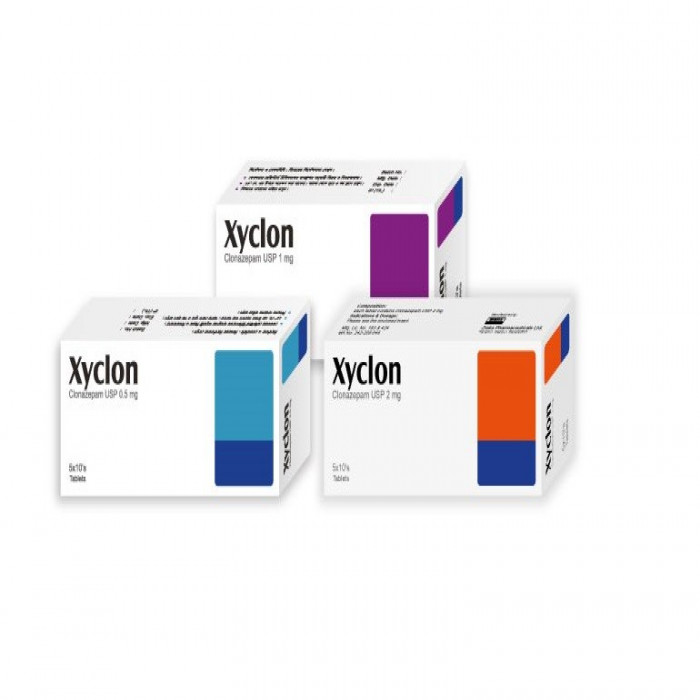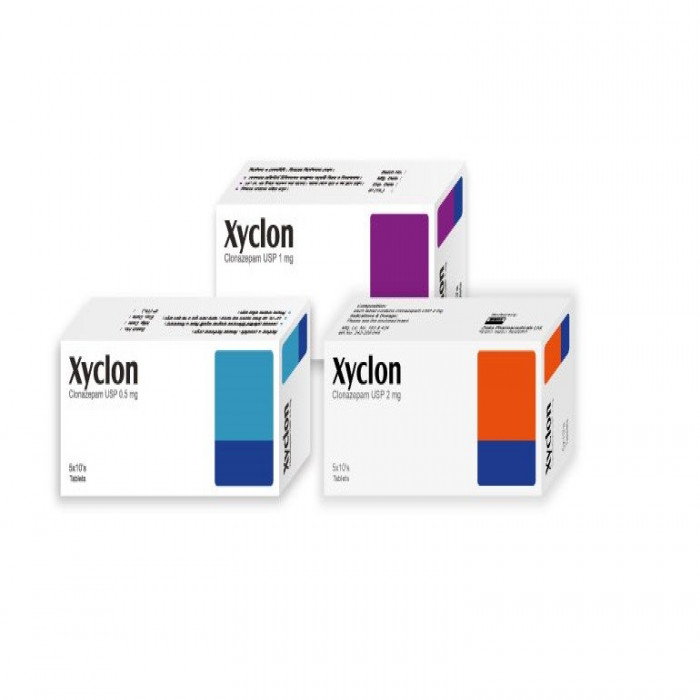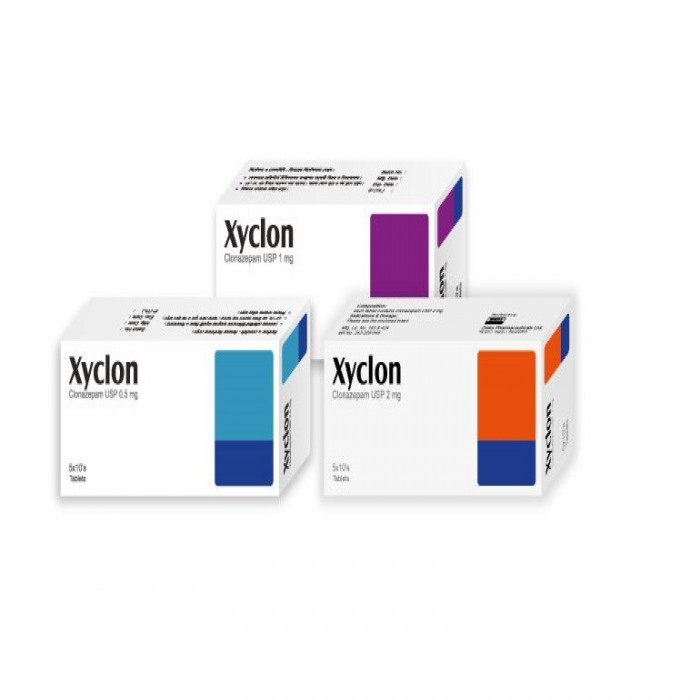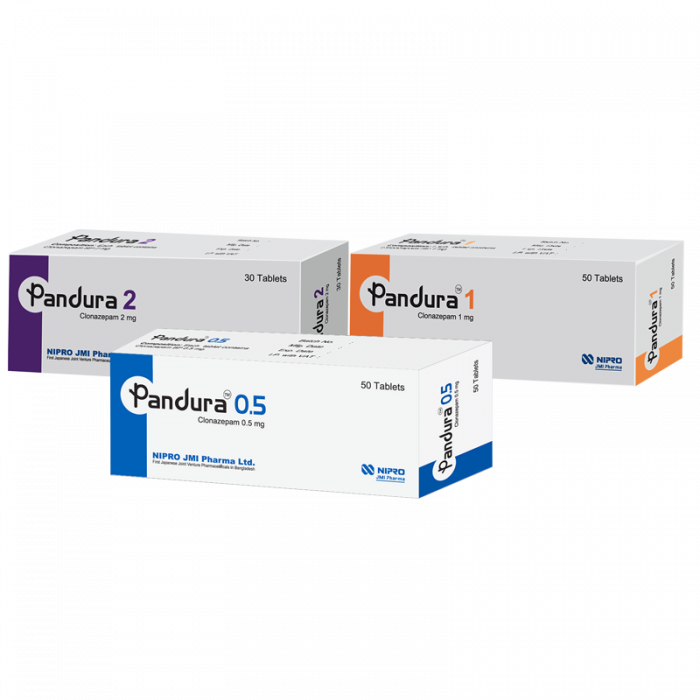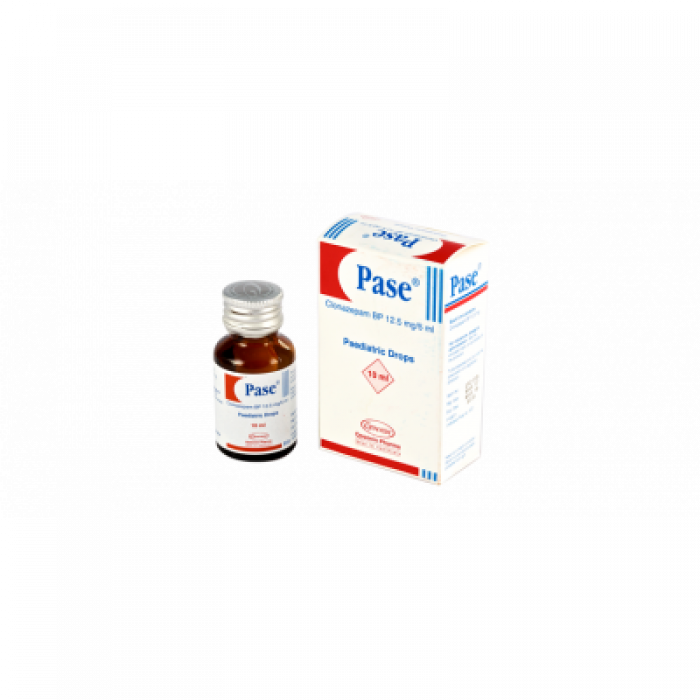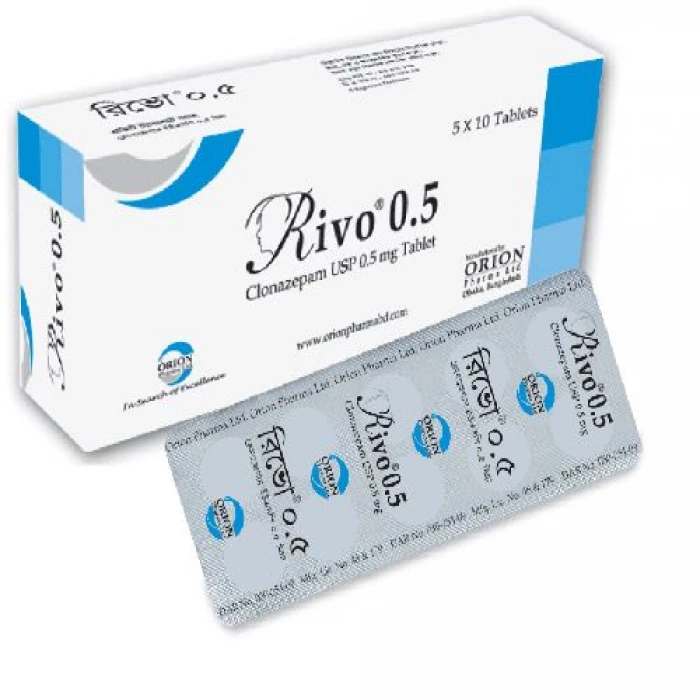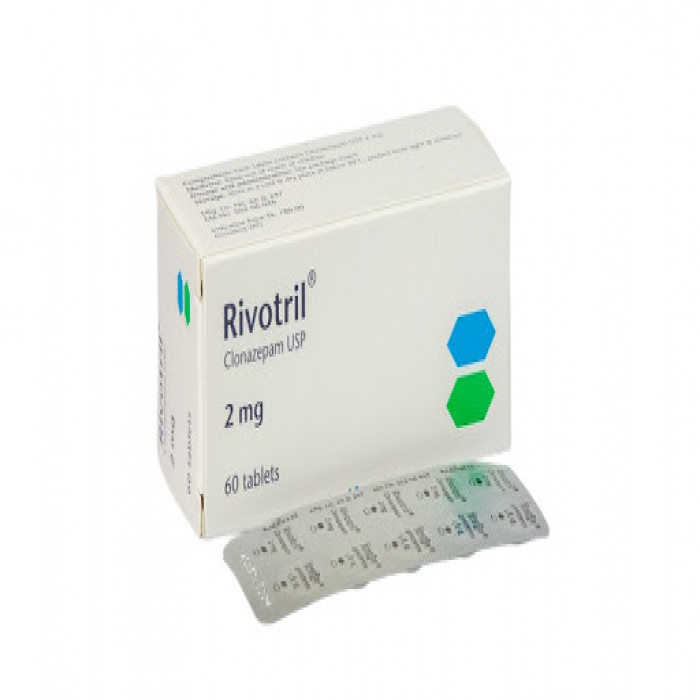
✔ 100% Authentic Product
👁️ Currently Viewing 5977
Anxiety is a mental health disorder characterized by excessive and persistent worry or fear that can significantly impact a person's daily life. Symptoms of anxiety may include rapid breathing, increased heart rate, restlessness, difficulty concentrating, and sleep disturbances.
Rivotril 2mg Tablet is a medication that works by increasing the activity of certain chemical messengers in the brain. It helps to promote relaxation of the brain and nerves, which can alleviate the symptoms of anxiety. By enhancing the effects of these chemical messengers, Rivotril can help reduce anxiety and its associated symptoms, allowing individuals to function more effectively in their daily activities.
📄Prescription Required
Discount
Price: ৳ 136
MRP:
৳
140
3%
Off

100% Genuine Products, Guaranteed

Safe & Secure Payments, Always

Fast, Secure & Efficient Delivery

Proper Packaging
 Cash on Delivery - All over Bangladesh
Cash on Delivery - All over Bangladesh Regular Delivery - 12-24 Hours, Dhaka City* Charge Tk.39-59
Regular Delivery - 12-24 Hours, Dhaka City* Charge Tk.39-59 Regular Delivery - 24-48 Hours, Other Cities* Charge Tk.99-110
Regular Delivery - 24-48 Hours, Other Cities* Charge Tk.99-110
 ফ্রি ডেলিভারিঃ - ৯৯৯ টাকা+ অর্ডারে, ঢাকা
শহরে
ফ্রি ডেলিভারিঃ - ৯৯৯ টাকা+ অর্ডারে, ঢাকা
শহরে ফ্রি ডেলিভারিঃ - ২৯৯৯ টাকা+ অর্ডারে, ঢাকার
বাহিরে
ফ্রি ডেলিভারিঃ - ২৯৯৯ টাকা+ অর্ডারে, ঢাকার
বাহিরে
100% Genuine Products, Guaranteed
Safe & Secure Payments, Always
Fast, Secure & Efficient Delivery
Proper Packaging
 Cash on Delivery - All over Bangladesh
Cash on Delivery - All over Bangladesh Regular Delivery - 12-24 Hours, Dhaka City* Charge Tk.39-59
Regular Delivery - 12-24 Hours, Dhaka City* Charge Tk.39-59 Regular Delivery - 24-48 Hours, Other Cities* Charge Tk.99-110
Regular Delivery - 24-48 Hours, Other Cities* Charge Tk.99-110 ফ্রি ডেলিভারিঃ - ৯৯৯ টাকা+ অর্ডারে, ঢাকা
শহরে
ফ্রি ডেলিভারিঃ - ৯৯৯ টাকা+ অর্ডারে, ঢাকা
শহরে ফ্রি ডেলিভারিঃ - ২৯৯৯ টাকা+ অর্ডারে, ঢাকার
বাহিরে
ফ্রি ডেলিভারিঃ - ২৯৯৯ টাকা+ অর্ডারে, ঢাকার
বাহিরে
✅ Description:
- Rivotril 2mg Tablet contains Clonazepam, which is classified as a benzodiazepine medication. It is primarily used to treat epilepsy in both adults and children, as well as panic disorder with or without agoraphobia in adults.
- Epilepsy is a neurological condition characterized by recurrent seizures or fits, which are caused by abnormal electrical activity in the brain. Symptoms of epilepsy can include uncontrollable jerking or shaking, loss of consciousness, or collapsing.
- Panic disorder involves the sudden occurrence of panic attacks or intense fear, often accompanied by physical symptoms such as rapid heartbeat, shortness of breath, and sweating.
- During treatment with Rivotril 2mg Tablet, your doctor may monitor your liver function through blood tests. It is important to avoid consuming alcohol while taking this medication, as it may increase the risk of seizures or worsen side effects, leading to excessive sedation.
- Rivotril 2mg Tablet is not recommended for individuals with conditions such as myasthenia gravis, acute narrow-angle glaucoma, sleep apnea, respiratory disorders, or severe liver disease. Consult your doctor before starting this medication if you have any of these conditions.
- Caution should be exercised when taking Rivotril 2mg Tablet in patients with mild to moderate liver disease, severe kidney disease, low blood pressure, depression, psychosis, schizophrenia, or certain other medical conditions. It is important to consult your doctor before initiating treatment.
- The use of Rivotril 2mg Tablet is generally not recommended during pregnancy unless it is deemed clearly necessary. Consult your doctor before taking this medication if you are pregnant. It is also generally not recommended for breastfeeding women, as it may pass through breast milk. Discuss the potential risks and benefits with your doctor before using Rivotril 2mg Tablet while breastfeeding.
- Special caution should be taken when administering this medication to children and elderly patients. Consult your doctor before initiating treatment in these age groups.
- Some serious side effects of Rivotril 2mg Tablet include suicidal thoughts, self-harming tendencies, or unusual changes in behavior or mood. If you experience any of these symptoms, contact your doctor immediately.
- Common side effects of Rivotril 2mg Tablet include drowsiness, dizziness, coordination problems, depression, fatigue, and memory difficulties. If any of these symptoms worsen or persist, contact your doctor. It is important to follow your doctor's instructions and report any concerns or side effects experienced during the course of treatment.
Safety Advices

Alcohol
UNSAFE
It is unsafe to consume alcohol with Rivotril 2mg Tablet.

Pregnancy
UNSAFE
Rivotril 2mg Tablet is generally not recommended for use in pregnant women unless considered clearly necessary. Consult your doctor before taking it.

Breastfeeding
UNSAFE
Rivotril 2mg Tablet is generally not recommended for use in breastfeeding women as it may pass through the breast milk and may cause drowsiness and feeding difficulties. Consult your doctor before taking it.

Driving
UNSAFE
Do not drive or operate heavy machinery as Rivotril 2mg Tablet may cause drowsiness.

Kidney
CONSULT YOUR DOCTOR
Rivotril 2mg tablets should be used with caution in patients with severe kidney disease. Consult your doctor before taking it.

Liver
CONSULT YOUR DOCTOR
Rivotril 2mg Tablet is not recommended for use in patients with severe liver disease. It should be used with caution in patients with mild to moderate liver disease. Consult your doctor before taking it.
✔️ Uses of Rivotril 2mg Tablet
- Seizure Disorder
- Seizures
- Panic Attacks
- Sleep Disorders
- Anxiety
✔️ How does Rivotril 2mg Tablet work?
Rivotril 2mg Tablet belongs to benzodiazepines which work by enhancing the activity of GABA (gamma-aminobutyric acid) an inhibitory neurotransmitter (a chemical in the brain).
✔️ Side Effects of Rivotril 2mg Tablet
- Depression
- Sleepiness
- Nervousness
- Allergic reaction
- Drowsiness
- Fatigue
- Blurred vision
- Muscle pain
- Mental Confusion
- Difficulty in speaking
✔️ Quick Suggestions:
- This medicine has a high potential for addiction or habit formation. It is important to take it only as prescribed by your doctor, following the recommended dose and duration.
- Be cautious of potential side effects such as dizziness, which may impair your ability to drive or perform tasks that require mental focus. Attend therapy sessions regularly to monitor your progress and discuss any concerns or adjustments needed.
- Maintaining a healthy diet is important for overall well-being. Additionally, staying active and exercising regularly can contribute to your overall health and mental well-being.
- Adequate rest and sleep are essential for your body and mind to recharge. Consider incorporating meditation into your routine as it can help alleviate anxiety.
- Avoid smoking, caffeine, and alcohol consumption as they can worsen your symptoms and interact with the medication.
- Certain foods and drinks like salmon, chamomile, turmeric, dark chocolate, green tea, and yogurt may have calming effects and assist with anxiety management.
- If you are using Rivotril 2mg Tablet and have open-angle glaucoma, your doctor may recommend regular eye checkups as the medication can worsen your symptoms.
- If you experience any changes in behavior, suicidal thoughts, or worsening anxiety, depression, anger, violent behavior, or mania while taking this medicine, consult your doctor immediately.
- Inform your doctor if you are pregnant, planning to conceive, or breastfeeding as they can provide guidance on the use of this medication during those periods.
✔️ Indication of Rivotril 2mg Tablet
Rivotril 2mg tablet acts by inhibiting the release of certain chemicals in the brain that are responsible for causing anxiety. By doing so, it helps in reducing the symptoms associated with excessive worry and anxiety, such as restlessness, tiredness, difficulty concentrating, irritability, and sleep problems. By alleviating these symptoms, it enables individuals to carry out their daily activities more effectively and be more productive. It is important to continue taking this medication as prescribed, even if you start feeling better. Suddenly stopping the medication can lead to serious problems and should be avoided.
In the treatment of epilepsy and seizures, Rivotril 2mg Tablet works by slowing down the abnormal electrical signals in the brain that trigger seizures. It can also help in reducing other symptoms related to seizures, such as confusion, uncontrolled jerking movements, loss of awareness, fear, or anxiety. It is important to note that it may take a few weeks for the medication to reach its full effect, as the dose is usually increased gradually. During this time, seizures may still occur. It is crucial to follow your doctor's instructions and not discontinue the medication without their guidance. Missing doses can potentially trigger a seizure, so it is important to adhere to the prescribed dosing schedule.
✔️ Pharmacology
Clonazepam is a medication that exhibits pharmacological characteristics similar to benzodiazepines. It possesses anticonvulsant, sedative, muscle relaxing, and anxiolytic (anti-anxiety) properties. The central effects of benzodiazepines, including clonazepam, are achieved by enhancing the activity of gamma-aminobutyric acid (GABA), an inhibitory neurotransmitter in the brain.
Benzodiazepines like clonazepam exert their action by increasing the affinity of GABA receptors for GABA neurotransmitters. This positive allosteric regulation leads to an enhanced effect of GABA on the chloride ion flow across the postsynaptic membrane. As a result, there is an increase in GABAergic neurotransmission, which helps to reduce neuronal excitability and produce the desired therapeutic effects of clonazepam, such as seizure control, sedation, muscle relaxation, and anxiety reduction.
✔️ Dosage & Administration of Rivotril 2mg Tablet
- For adults with seizure disorders, the initial dose of clonazepam should generally not exceed 1.5 mg per day, divided into three doses. The dosage can be gradually increased by 0.5 to 1 mg every 3 days until seizures are effectively controlled or until side effects become problematic. The maintenance dosage should be personalized for each individual based on their response to the medication. The maximum recommended daily dose is 20 mg.
- For adults with panic disorder, the initial dose is typically 0.25 mg given in two divided doses. After three days, the dose may be increased to a target dose of 1 mg per day for most patients.
- In pediatric patients (infants and children up to 10 years of age or weighing up to 30 kg), the initial dose should be between 0.01 and 0.03 mg/kg per day, not exceeding 0.05 mg/kg per day. This dose should be divided into two or three doses throughout the day to minimize drowsiness.
- Take Rivotril 2mg Tablet as advised by your physician. It can be taken with or without meals. Swallow the medicine with a glass of water. Do not crush or chew the medicine. It's important to note that these dosages are general guidelines and individual variations may occur. It is essential to consult with a healthcare professional for precise dosing instructions based on the specific needs and conditions of the patient.
✔️ Interaction
Clonazepam should be used with caution in certain populations, including neonates (newborn infants), individuals with chronic pulmonary insufficiency (lung disease), hepatic (liver) or renal (kidney) dysfunction, and those with porphyria (a group of rare genetic disorders). Special consideration should also be given to elderly patients.
Regarding pregnancy and lactation, clonazepam is not recommended during these periods. The medication can pass into breast milk, which may pose a risk to the nursing infant. It is important to consult with a healthcare professional for appropriate guidance and alternative treatment options if you are pregnant or breastfeeding.
✔️ Contraindications
It should not be taken in individuals who have a history of benzodiazepine hypersensitivity, or in patients who have clinical or biochemical indications of severe liver damage. It is safe to use in individuals with open-angle glaucoma who are getting adequate treatment, but it is not safe in people with acute narrow-angle glaucoma.
✔️ Pregnancy & Lactation
It cannot be completely ruled out that clonazepam (the active ingredient in Rivotril) may have the potential to cause congenital malformations based on preclinical studies. There is evidence from epidemiological evaluations that anticonvulsant drugs, including clonazepam, may act as teratogens (agents that can cause birth defects). However, it is challenging to determine from published reports which specific drug or combination of drugs is responsible for the observed defects in newborns. It is also important to consider other factors such as genetic factors or the underlying epileptic condition itself, which may play a significant role in birth defects.
In light of these considerations, Rivotril should only be used in pregnant women if the potential benefits to the mother outweigh the potential risks to the fetus. During pregnancy, Rivotril should be administered only if there is a compelling indication for its use. It is worth noting that high doses of the medication administered in the last trimester of pregnancy or during labor can cause irregularities in the unborn child's heartbeat, as well as hypothermia, hypotonia, mild respiratory depression, and poor feeding in the newborn. It is important to be aware that both pregnancy itself and abrupt discontinuation of the medication can lead to an exacerbation of epilepsy.
If you are pregnant or planning to become pregnant, it is essential to discuss the potential risks and benefits of using Rivotril with your healthcare provider. They will be able to assess your individual situation and provide appropriate guidance and recommendations based on your specific needs.
✔️ Precautions & Warnings
Clonazepam, when taken by individuals with multiple seizure disorders, may potentially increase the incidence or hasten the onset of generalized tonic-clonic seizures (also known as grand mal seizures). As a result, additional anticonvulsant medications may be required or the doses of existing anticonvulsants may need to be adjusted.
It's important to note that the concurrent use of valproic acid (another anticonvulsant medication) and clonazepam may lead to the development of an absent status, which refers to a type of seizure characterized by a loss of consciousness and absence of movement.
If you are taking clonazepam or any other anticonvulsant medication, it is crucial to follow your healthcare provider's instructions and regularly communicate with them about your condition and any potential side effects or concerns. They will be able to assess your individual situation, monitor your medication regimen, and make any necessary adjustments to ensure optimal seizure control and overall well-being.
✔️ Storage Conditions
- Keep Rivotril 2mg Tablet out of sight and reach of children
- Store at room temperature
⚠️Disclaimer:
At ePharma, we’re committed to providing accurate and accessible health information. However, all content is intended for informational purposes only and should not replace medical advice from a qualified physician. Please consult your healthcare provider for personalized guidance. We aim to support, not substitute, the doctor-patient relationship.







